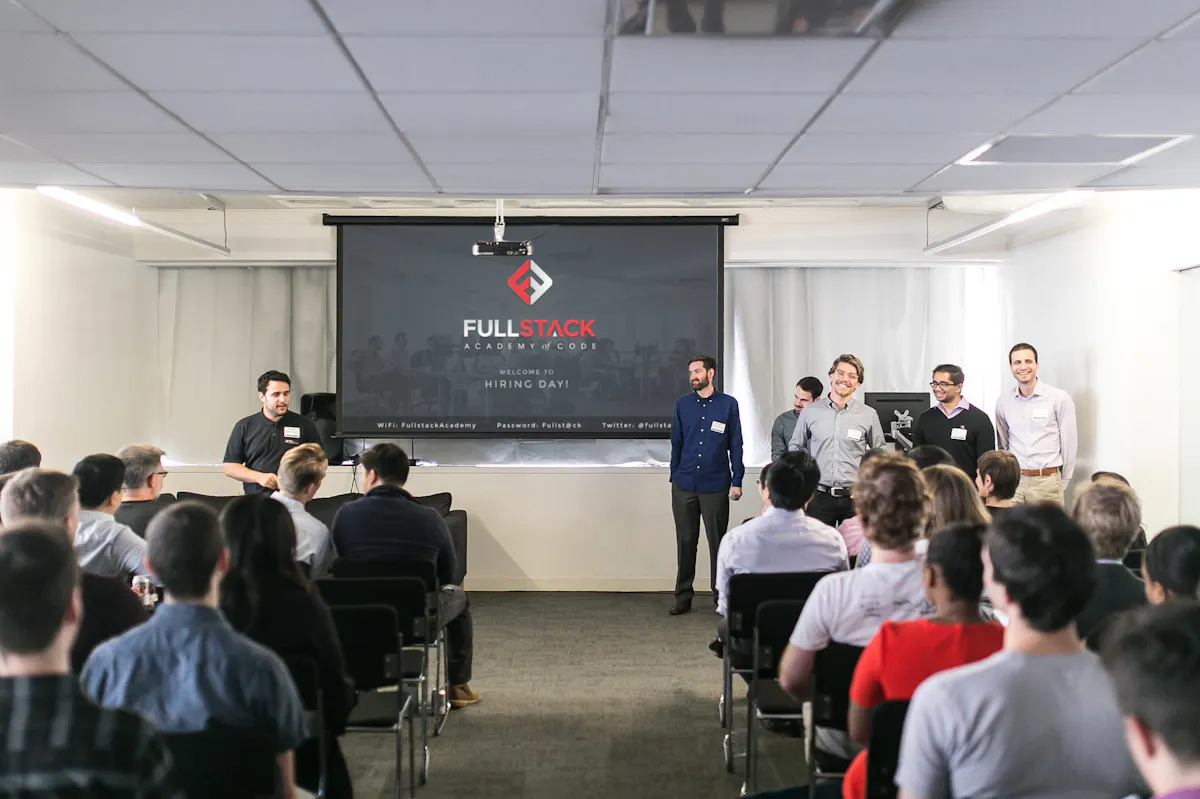Fill out the form to get more information about the Grace Hopper Program bootcamp of your choice.
Yes, Fullstack Academy's Hiring Outcomes Are Really That Good
By Huntly Mayo-Malasky

Hiring outcomes at the top coding schools (Fullstack Academy, Hack Reactor, Flatiron School, App Academy, etc.) have gotten a lot of attention, both positive and negative. While employment results in the mid-to-upper nineties seems unbelievable, when you look deeper into the details of what makes these programs elite, the reality of the outcomes doesn’t seem so far-fetched.
At Fullstack, 4 main factors drive our successful hiring outcomes: Admissions, Curriculum Design, Job Search Prep, and Job Market Dynamics.
1. Admissions - It’s not a coincidence that the coding schools with the highest job placement rates also have the lowest admissions rates. These bootcamps are very outcome focused - For Fullstack, when we accept someone into the immersive program, we’re essentially promising you that if you work hard during and after the course, you’ll be successful in a job search. That job outcome focus means we have to teach an advanced, relevant curriculum (getting a job requires a strong technical skill-set), which translates to the need for a selective admissions process, to ensure that students are well prepared to succeed in the challenging academic environment. Someone accepted into Fullstack already knows the fundamentals of programming, if not more (that by itself is not easy to achieve). So that cohort of people is, by definition, likely to be successful in a job search.
2. Curriculum Design - The curriculum at Fullstack is updated regularly - Small optimizations happen every 7 weeks, based on educational data we collect from our self-created LMS, and from feedback we get from students. Larger changes happen throughout the year, like entire overhauls of a portion of the curriculum. These large changes are driven by industry research and feedback from Fullstack’s hiring partners. We are constantly looking at what the most in-demand technologies are in the job market… Then we build that into the curriculum.
3. Job Search Preparation - When a company is looking to hire a developer, they are mainly trying to evaluate if someone has solid programming skills and knows some relevant technologies (or can learn new ones relatively quickly). Software Development is very much a hard-skills field - More than anything else, if you have the right skills then you’ll be able to get a job. The two main ways companies screen for these skills is by looking at your experience and by giving challenging technical interviews.
Experience - Q: If companies are looking at your experience, how can you succeed if you haven’t worked as a developer before? A: By building impressive projects (functional applications) and sharing the code open-source on the web. The projects you build at a coding bootcamp essentially become your new resume. And the code you write to build those projects is shared with the public on a site like Github. Companies will then review your projects and often the actual code you’ve written for them. That’s why having a good portfolio is so important for coding school students, and why at Fullstack we’ve invested so much into students building impressive projects.
Technical Interviews - This is a deep topic that’s been a long-time source of controversy in the developer community... In most developer job interviews, you’ll be asked to solve difficult programming challenges by writing out code on a whiteboard. If you want to secure a job, you’ll need to be good at that, and it’s a somewhat specialized skill to build. At Fullstack, students practice white-boarding technical interview questions almost every morning of the 2nd half of the immersive portion of the course. Books like Cracking the Coding Interview are also strongly recommended.
4. Job Market Dynamics - The developer job market… So hot right now. If you’re researching coding bootcamps then you’ve probably heard about the shortage of talent in software development. Essentially there are more open positions than qualified candidates - you can conduct a search on a popular job site to verify that open positions are out there. This shortage of qualified developers is the high-level trend driving the success of the entire coding bootcamp industry. There is just a lot of demand for developers out there. But you need to have strong knowledge/skills of relevant technologies, an impressive portfolio, and good interview skills to be able to take advantage of it.
After looking into the inputs for the high job placement rates for “top-tier” coding bootcamps, the final results are not quite as magical... These schools have thorough admissions processes, so the student body is already selected for people who are likely to succeed (strong technical foundation and good work ethic). Then the curriculum taught and the job search preparation is very tailored to match what’s in-demand in the industry. And finally, there’s a lot of companies hiring developers, so it’s a (qualified) job-seeker’s market.


